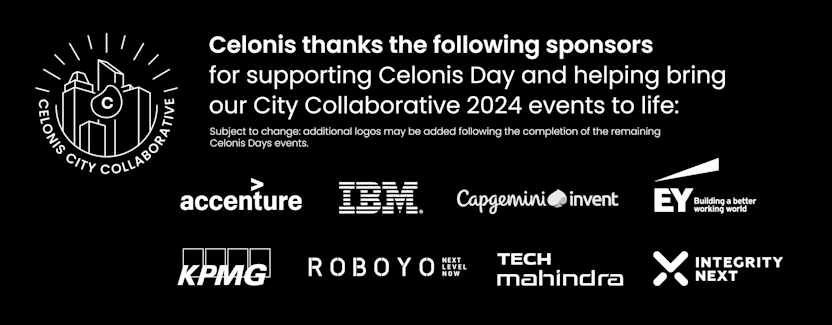
Transforming business processes: Key insights from experts at Cisco, HCA, PayPal, and Wells Fargo during Celonis Day NYC and Bay Area
Business transformation efforts fall into two categories. There are the major strategic initiatives aimed at enterprise-level change - “Big T” transformations. Then there are the continuous, incremental improvements and adjustments - “Little T” transformations. Organizational change can start from either direction, because as lead evangelist at Celonis Kerry Brown said recently, “Large scale change requires many changes across an organization, and when you add up all the Little Ts, they become a Big T.”
During Celonis Day events in New York City and San Francisco in May, part of Celonis City Collaborative 2024, Brown hosted a customer panel centered on how process mining and process intelligence empower organizations through the discovery, design, and roll out phases of the transformations to ensure successful business outcomes.
In San Francisco, she was joined on stage by Jack Templeton, Senior Manager Compliance Investigations - Global Financial Crimes & Customer Protections at PayPal and representative from Cisco. In New York, Brown was joined by Maximilian Schoen, Executive Director Operational Excellence & Digital Transformation Global Operations at Wells Fargo, and Matthew Oliver, AVP of Finance Operations Care Transformation & Innovation at HCA Healthcare.
Watching the panel discussions and participating in audience Q&As were hundreds of changemakers—business professionals, thought leaders, and process experts who “know that processes can work smarter, work better - for people, companies, and the planet.”
Process transformation: Key takeaways and learnings
Balancing Incremental and Strategic Transformation: Understanding and balancing both incremental and strategic changes are vital for sustained improvement and innovation.
Data Accuracy and Interdisciplinary Collaboration: Accurate data and effective collaboration across various expertise areas are crucial for success.
Communicating Impact and Addressing Skepticism: Transparent communication and demonstrating tangible benefits are key to overcoming resistance (particular to new technologies) and securing executive support.
Technology as a Game-Changer: Process mining, task mining and process intelligence provide the insights necessary to significantly enhance operational efficiency and effectiveness.
Cisco Systems: Supporting supply chain transformation
Cisco Systems, which provides networking and telecommunications hardware, software and services, began using Celonis several years ago to optimize the company’s customer service process—specifically its Reliable Premium Services. Using Celonis, Cisco was able to automate over 50% of the manual activities in its 2-hour service delivery process. At Celonis Day Bay Area, a representative from the IT organization that supports the company’s supply chain talked about other Celonis use cases their team is working on, specifically the order-to-invoice process.
“Using Celonis, we were able to find that there were 60% of our orders that were put on hold,” they told Brown and the audience. With Cisco getting around 1,500 orders a day, that’s a significant number. The reason for a hold varies. It could be a shipping hold or financial hold. Regardless of the reason, they said removing the hold takes a lot of manual effort. First, a team member must investigate why the hold occurred, which sometimes requires contacting a third party, such as one of Cisco’s shipping partners. Only once they understand why the hold happened, can they remove it.
“We put Celonis to work there, and I was actually just reading these stats before the meeting,” they said. “They were able to reduce the amount of skilled labor required to take these orders off hold by 30%, and they were able to see a 40% increase in revenue quarter-over-quarter because of the decreased time that these orders are put on hold.”
When asked how they communicate successes like this outside of IT, particularly to executives, they said it all comes down to tailoring the message to the recipient—using language that they can understand. “The language for IT is different [from] the language [for] supply chain [which] is different [from] the language [for] the other businesses,” he said.
Using the right language is particularly important when introducing a Celonis for the first time. “I don't lead with process mining,” the representative told the crowd. “I lead with something that they're going to relate to.” Take the order-to-invoice process for example. If the representative caught someone around the watercooler, they might lead with something like, “Hey, did you know that 60% of our orders are on hold? And, here's the 3 or 4 reasons why.”
They said question and answer combinations like this are a great conversation starter because people usually ask follow-up questions, such as “How do you know that?” That’s when they introduce process mining and Celonis.
Read: Supply chain transformation: Building resilience with Process Intelligence
HCA Healthcare: Improving patient care with process intelligence
Coming out of the COVID-19 pandemic, Matt Oliver was looking for ways to transform operations at HCA Healthcare, which operates over 180 hospitals and approximately 2,400 sites of care in the US and UK. He wanted to drive change across the organization at the enterprise level, and as part of the Care Transformation & Innovation Group, he was on the lookout for “creative ways of thinking” and new technologies to accomplish this. “Celonis fit that bill,” Oliver told Brown and the audience.
“No one has really applied process mining to the patient experience and the patient journey,” Oliver said. “So we wanted to take as a group, and map out what does that look like from the time the patient comes in the door, to the time they leave our hospitals, and really figure out where the inefficiencies in that process are, where can we get things back on track, and in doing so, improve the quality of care that our health system is seeing and the patients experience along the way.”
They started in the emergency room. Oliver explained that the vast majority of HCA’s 43 million annual patient encounters happen within the ER, so improving ER efficiency would have a major impact on the patient journey. If a patient spends extra time in the ER, there’s a greater chance they’re going to be uncomfortable, he said. Likewise, if the first patients of the day don’t move through the ER efficiently, not only could their care be affected, but the delays will compound throughout the day, affecting the care of the patients that come in at midnight.
Oliver and the team knew that to get buy-in from the clinicians, the doctors and nurses who would implement any ER process improvements, they needed an “airtight” case for their change recommendations based on real-world data. So, the team pulled information directly from their electronic medical record system into Celonis. “We spent the vast part of our first 18 months of this journey, probably the first year really, making sure that we knew and understood every activity that was taking place,” he said. “That we had all of those mapped correctly in the system and then could build upon that.”
With the data inside Celonis, the platform was able to deliver meaningful process insights, showing the team which KPI improvements would have the largest impact. “The system is great about saying, ‘Hey, if you would improve and hit [your] goal on this specific throughput metric, then you're going to see the biggest bang for your buck in terms of the overall performance.’”
Oliver also highlighted the importance of having an interdisciplinary team to HCA’s transformation success. “We've got leaders on the data science side, clinical leaders that can bring insight into what's going on in this space, and we really came together as a team to approach this problem with Celonis, bringing the expertise from the Celonis team into the mix and truly being able to map out what problem we were trying to solve for,” he said “So, I think we were very good and intentional about bringing the right people to [the] conversation and really driving towards that common goal.”
Read: Process Intelligence: Helping providers overcome the great disconnect in healthcare
PayPal: Optimizing compliance investigations
Jack Templeton and his team at PayPal are laser-focused on protecting their customers and the company from global financial crimes and meeting the organization's regulatory obligations. Addressing the San Francisco audience, Templeton explained how the financial technology company uses Celonis to optimize its compliance investigation process. “Our number one use case is in our anti-money laundering and terrorist financing investigations,” he said. Using Celonis, Templeton said they can explore questions such as, “What do those processes look like? Where are our bottlenecks in this highly manual process? And where are our [improvement] opportunities?”
Templeton also agreed with the other panelists, both in the Bay Area and New York, that using language familiar to their constituents was crucial to getting that all-important executive buy-in. “And that's what I've been working with this team on,” he said. “Wording [our message] in their language, so that the executives [say], ‘They're speaking my language. They understand what I'm saying, and they get us.’” Templeton also shared how the cooperation and collaboration between his team at PayPal and the team at Celonis has been particularly helpful framing their value story. “If you can put a dollar value on it, it's much easier to prioritize with our executives,” he said.
Read: Mitigating Risk in Finance Processes: A Proactive Approach with Process Intelligence
Wells Fargo: Using Celonis for operational intelligence
Wells Fargo began working with Celonis in 2019 and uses the platform across the bank in areas such as complaints management, credit card claims and lending. Maximilian Schoen joined the financial institution in 2018 and oversees the bank’s no-code workflow. He took over the center of excellence (CoE) in 2022, and is working to help Wells Fargo use Celonis as a diagnostics and process improvement solution, but also as an operational intelligence platform. Schoen sees Celonis as something that “we can really use on a day-to-day basis to help our team make smarter decisions, better decisions.”
Using Celonis, Schoen and the team created “cockpits'' that combine data from disconnected systems into a single view. This gives people information from not just one system or for one process, but an end-to-end view of daily operations. “Our goal is to provide our processors, our analysts, our team members, a cockpit with a view that previously they would have to go to multiple disjointed systems,” he said. In addition, the team uses Action Flows to trigger automations and task mining to enhance operational efficiency by identifying and reducing non-value-added activities.
Read: Process Intelligence will transform banking: Here’s how




